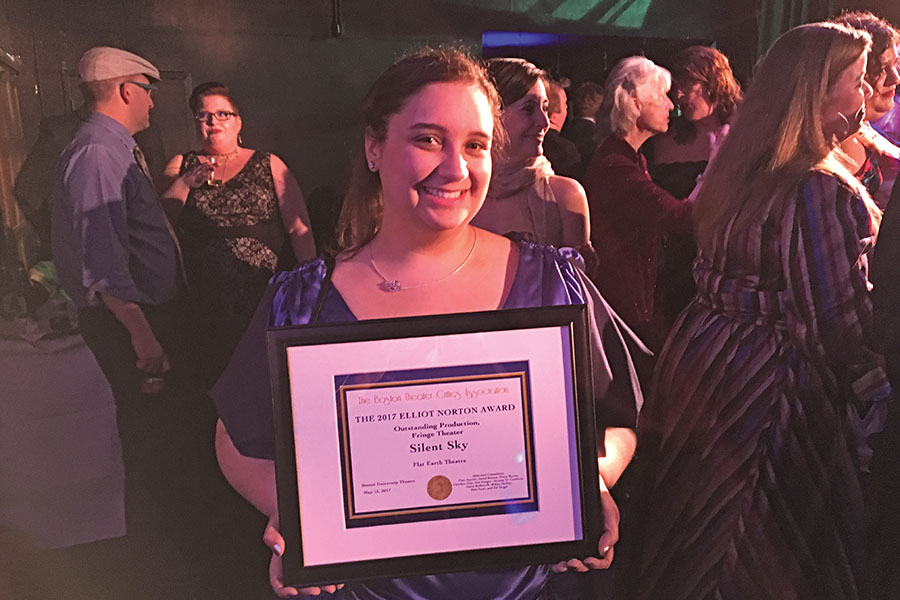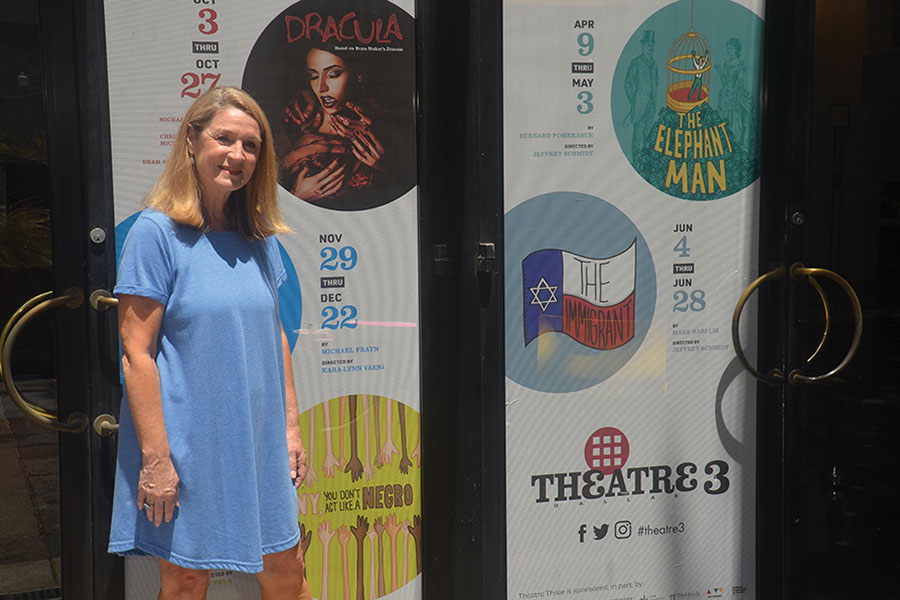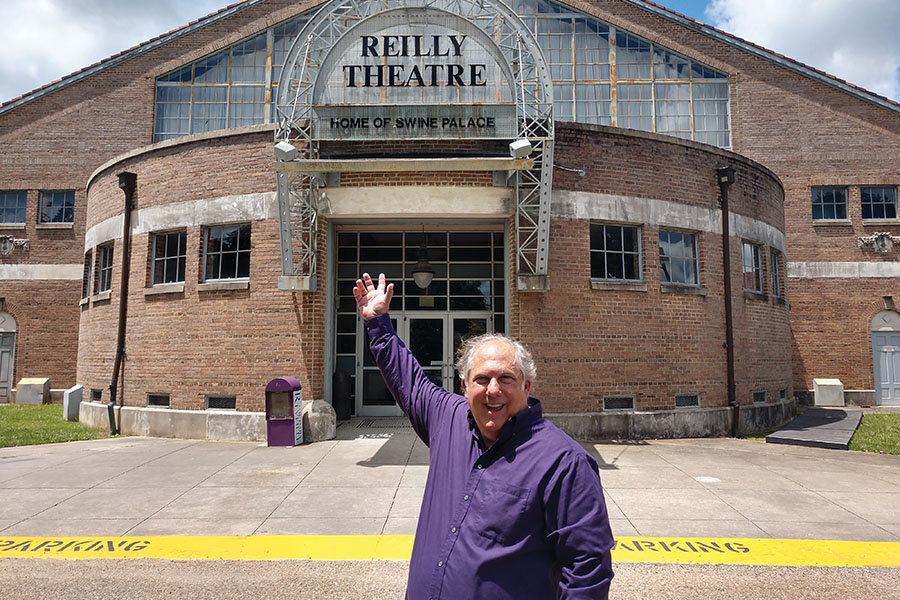“You haven’t made it until you’ve made it in New York.” The aphorism is almost biblical, etched into the minds of America’s aspiring and master artists. The Great White Way beckons and thousands follow. Not-yet-jaded BFA grads and community theatre ingenues alike have their minds set in one direction: toward Gotham. They dream of the actor’s tireless grind, the infinite Backstage audition notices, the pizza-snacking subway rats. They can almost smell the hairspray emanating from the freshly coiled pin curls in Ripley-Grier’s hallowed halls. But before they book that one-way ticket, they might want to take one last trip back to the drawing board.
Unbeknownst to some, incredible work is happening all over the U.S. Established theatres are producing top-tier productions from the fruited plains all the way to those purple mountains, allowing local theatre professionals across the nation to fill both their creative souls and their wallets.
According to the Actors’ Equity 2018 Regional Theatre Report, which measured work weeks in cities other than the entertainment meccas of NYC, Chicago, and L.A., there’s work to be had outside of the major markets. Below we profile half a dozen AEA members who are making a living, and a life, in their resident metropolises.

BOSTON
Have you ever wanted to mold NYC into a place that’s quieter and cleaner but still maintains an invigorating theatre community and downtown charm? Beantown might be just what you’re looking for. AEA lists 1,125 members in this historic city for an average of around 9.6 work weeks per member. Equity stage manager Elizabeth Yvette Ramirez did a four-year stretch at Boston University and couldn’t bring herself to leave. That was six years ago; she’s since made the Hub her home.
Where to work: Ramirez jumps from place to place, including the Reagle Music Theatre, Greater Boston Stage Company, Bridge Repertory Theater, Central Square Theater, and Moonbox Productions. This brings her to about 35-40 work weeks per year. An average SM salary averages out to $530 a week. “Equity has done a great job negotiating for stage managers, and we’re starting to see a real improvement,” she says.
House hunting: After sampling her share of Boston real estate in the Brighton and Somerville areas, Ramirez and her wife have settled into a home in Malden. She enjoys the easy commute into town and her neighborhood’s diversity. “In Boston, you can tell how old someone is by how far they’ve moved out of the city,” she says. “It starts with Jamaica Plain, Allston, Brighton, and getting a small apartment in an older building. Now my peers in their late 20s and early 30s have moved into the Medford/Malden area and beyond, where cars are more common and you can get a little more space.”
Side hustles: Ramirez manages more than the stage in her free time. She walks dogs with the Wag App and is a teacher at KidStock! Creative Theater. Other common gigs for artists here are historical tour guides and university administration, due to the substantial number of colleges in the area.
When she’s not working: “Most of my nights out are either spent seeing friends in their shows or the other arts: ballet, opera, or community events,” says Ramirez. “The city has so much arts and culture at all times.” Indeed, she raves, “The city is vibrant and growing while still having the atmosphere of a small community.” The kind of place, she says, where “going to an opening night feels like a reunion in the audience.”

PHILADELPHIA
Philly has emerged as a Pennsylvanian arts hub. With work weeks per Equity member averaging at 6.7 per year and a total of 1,198 members employed (for comparison, NYC boasts 19,950), there is certainly no onstage shortage. Christopher Sapienza, a 25-year Equity card holder, was born and raised in the area and still proudly calls it both home and workplace.
Where to work: Sapienza has partnered with a handful of the area’s most renowned houses, including the Walnut Street Theatre, the nation’s oldest theatre (founded in 1809). Sapienza’s other stints include the Fulton Opera, Arden Theatre Company, Act II Playhouse, Bristol Riverside Theatre, and the 11th Hour Theatre Company. In his experience, contracts usually span from six to eight weeks. As for salary, he explains: “A good average is between $500 to $800 per week on an LOA [letter of agreement] or LORT contract, and in some cases those LORT contracts can even get closer to $1,000.”
House hunting: Sapienza resides in the suburbs of Upper Darby, Pa., a zippy 20 minutes outside of the city center, in his childhood home. He adores the neighborhood’s true hometown feel. “I love my neighborhood for its diversity,” he enthuses. “My block alone is diverse in race, religion, sexual orientation, and age. We all look out for one another.” Theatre colleagues have flocked to neighborhoods including South Philly, Kensington, and Delaware County. Rent runs anywhere from $900 a month for a one-bedroom or studio to $2,000 for a single family home.
Side hustles: “Do I have a side hustle? You bet I do! And not just one,” exclaims Sapienza. When he’s not onstage, he’s shooting headshots for fellow actors and corporate events. He is also a part-time music and acting teacher at Overbrook School for the Blind. “Look, if you need to keep a roof over your head and the electric on, you do what you’ve gotta do,” says Sapienza. “Create your world and you will thrive.”
When he’s not working: Sapienza takes advantage of Philly’s natural and historical offerings: “Lots of times I’ll even just go for a walk at Ridley Creek Park, Valley Forge National Park, or East Goshen Park.”

MINNEAPOLIS/ST. PAUL
These Twin Cities have 557 members working an average 12.3 weeks. The arctic winters might reach sub-zero temperatures, but the opportunities are hot. Union actor Greta Grosch has both participated in and built these projects throughout the span of her last 20 years as a Minnesotan.
Where to work: “The Twin Cities has over 70 professional theatre companies, and about half of them use Equity actors—either because they are an Equity theatre or because they hire guest artists,” says Grosch. “I have worked with Old Log, History Theatre, Yellow Tree Theatre, the Ordway, Theatre Elision, SOS, Illusion, Minnetonka Theatre, and the Playwrights’ Center.” She also creates theatre with Troupe America Inc., where she writes and tours Church Basement Ladies, a musical comedy series, at fairs, festivals, and “mother-daughter banquets.” Grosch always has her hand in something, working about 45 weeks a year.
House hunting: Grosch owns a 1911 duplex in the Summit-University neighborhood of St. Paul. “I live in one side and rent out the other, which is a great way to support myself,” she says. “There are a lot of charming older homes in the Twin Cities that are affordable, and great starter homes for people.” Many artists gravitate toward Northeast Minneapolis, and the base rent runs around $700 to $900 throughout the Twin Cities for a one-bedroom.
Side hustles: “I am also a writer, corporate trainer, and entertainer,” Grosch says. Indeed she calls the area “the land of opportunity” for the self-starter. Professionals in the area also do voiceover and on-camera work due to the blooming commercial market.
When she’s not working: “Minnesota is the ‘land of 10,000 lakes,’ and there are a whole lot of them in the Twin Cities,” Grosch exclaims. “The nice weather has folks out and about. Walking, biking, eating, drinking, and soaking up the nice weather before the snow hits again. The extreme weather makes for hardy folks, and there are lots of great parks and patio eating areas as a reward for making it through another winter.” Work-life balance is the draw, she concludes. “An artist can create a stable life for themselves,” she says. “Generally, if you are willing to be creative and are motivated, this is not a place where you have to struggle for your art. The two can coexist in a healthy way.”

SOUTH FLORIDA
Take a ride to where the sun does shine. There are 595 AEA members working an average of 5.1 week contracts in the Palm Beach, Broward, and Miami-Dade county areas. Equity card holder Irene Adjan has a palm tree-lined theatrical paradise right in her backyard. And with close to 20 years of Floridian citizenship under her belt, she is not heading out any time soon.
Where to work: Adjan has acted at Maltz Jupiter Theatre, Palm Beach Dramaworks, the Wick, GableStage, Actors’ Playhouse, Zoetic Stage, and City Theatre. She works about 16 weeks a year at these houses, and is always impressed with the production scope. The Maltz may be your go-to if you’re keen for mammoth musicals, while Actors’ Playhouse is a fit for those who crave a contemporary and traditional mix. She has seen salaries range from $385 to $1,095.
House hunting: Adjan lives away from the Miami hurlyburly in a townhouse in charming Coral Springs. Located between Ft. Lauderdale and Boca Raton, she has easy access to her varying places of work. “From end to end, our theatres cover about 125 miles, and a South Florida actor spends an enormous amount of time in their car,” she concedes. “I choose to live in Coral Springs because it is equidistant between the theatre that is furthest north and the theatre that is furthest south.”
Side hustles: Office jobs that allow schedule flexibility can be a dime a dozen, and that’s where Adjan spends her daytime hours. Many of her colleagues and friends waitress, teach private students, and dabble in voiceover work to cover expenses.
When she’s not working: Adjan loves taking advantage of the region’s thriving food scene. “South Florida is heaven to any foodie because you can find any kind of cuisine very easily,” she says. “It is extremely multicultural, so you can get very authentic cuisine from just about any country or region in the world.” Her favorite neighborhood for a good meal: Miami’s Little Havana.

DALLAS/FORTH WORTH
Barbecue isn’t the only thing that’s cooking in Texas. AEA members number 463, and they average 7.1 work weeks. Actor Lisa Fairchild traded NYC for the Lone Star state decades ago, and has since formed a 35-year-old career here.
Where to work: Fairchild has saddled up at Theatre Three, Dallas Children’s Theater, Circle Theatre, Stage West, WaterTower Theater, Casa Manana, and Shakespeare Dallas, where she usually performs for 16 to 20 weeks out of the year. Equity contracts usually range from $250 to $400 a week.
House hunting: She owns a condo in the Turtle Creek/Oak Lawn area, overlooking the Kalita Humphreys Theater. “The Uptown area of Dallas is a few steps from our front door,” she says. “While many actors do live in this area (it is an easy walk/drive to many of the Dallas theatres), it is fairly expensive. Average rent for a one-bedroom apartment in the Uptown area is $1,300 a month. Other popular areas in Dallas for actors to live are the East Dallas area near White Rock Lake, the Oak Cliff area, and Deep Ellum.”
Side hustles: Fairchild balances a variety of jobs that make use of her public speaking skills, such as sales and leadership management training for pharmaceutical companies, and deposition and trial training for law firms; she also writes book reviews for book clubs. “Many of my fellow actors are professors or theatre high school teachers,” she says. “Popular side hustles for other actors are working for health promotion companies like Shaklee and online sales companies like StitchFix.”
When she’s not working: Fairchild spends a lot of her time outside; she will sometimes take a walk along the Katy Trail, a renovated railway in Dallas, to relax and learn her lines. “We also love the Arboretum on White Rock Lake for laidback beautiful nature, and many locally sourced restaurants nearby for meeting up with friends,” she says.

NEW ORLEANS/BATON ROUGE
Bourbon Street, beignets, and bracing theatre: a winning combination. This party capital is rich with culture, alcohol of every variety, and innovative art. John Bostic practices his craft here, alongside 170 other AEA members whose annual average work weeks are 4.5. That may seem modest, but according to the AEA report, it’s the nation’s fastest-growing theatre city.
Where to work: Bostic has spent nearly two decades working at places like Southern Rep, New Orleans Shakespeare Festival at Tulane, and the National WWII Museum. Other artists frequent Southern Rep, Le Petit Théâtre du Vieux Carré, the NOLA Project, Tennessee Williams Company, Anthony Bean, and the New Lafon Performing Arts Center. A contract typically spans between $225 and $350 a week for smaller theatres, and around $600 for those with a larger budget.
House hunting: He lives away from the center’s 24/7 jazzy jamboree in the tranquil Northshore. “Many actors live in the Bywater, Mid-city, Algiers Point, Gentilly, and Jefferson Parish,” he says. “Each has its own unique flavor and a range of housing prices. The Lower Garden District is another artist haven, and is near most of the area TV and film casting directors, but has increased in price in the last few years due to national publicity.” Rent tends to float around $700 to $1,000 for a one-bedroom.
Side hustles: Bostic crafts custom publications for local businesses. Other artists are often teachers by day, he says.
When he’s not working: “Food in New Orleans is a full-time exploration,” says Bostic. “I love R&O Seafood on the lakefront. Café Degas has a great atmosphere and Dragos Charbroilled Oysters are amazing.” Indeed, he notes, “New Orleans is a lifestyle. It is a place where the whole city is your local bar. People are friendly and relaxed. The pressure is low and there is always a party somewhere.” It’s not for everyone, but it’s heaven for the initiated. “Either the New Orleans vibe infects you or it doesn’t; I don’t think there is a middle ground. You see it as charming or as a city of many flaws. But if you see it as beautiful, exciting, and if it gets in your blood, you will never leave.”
Steph Golub, a former intern of this magazine, is a writer, actor, and native New Yorker.


